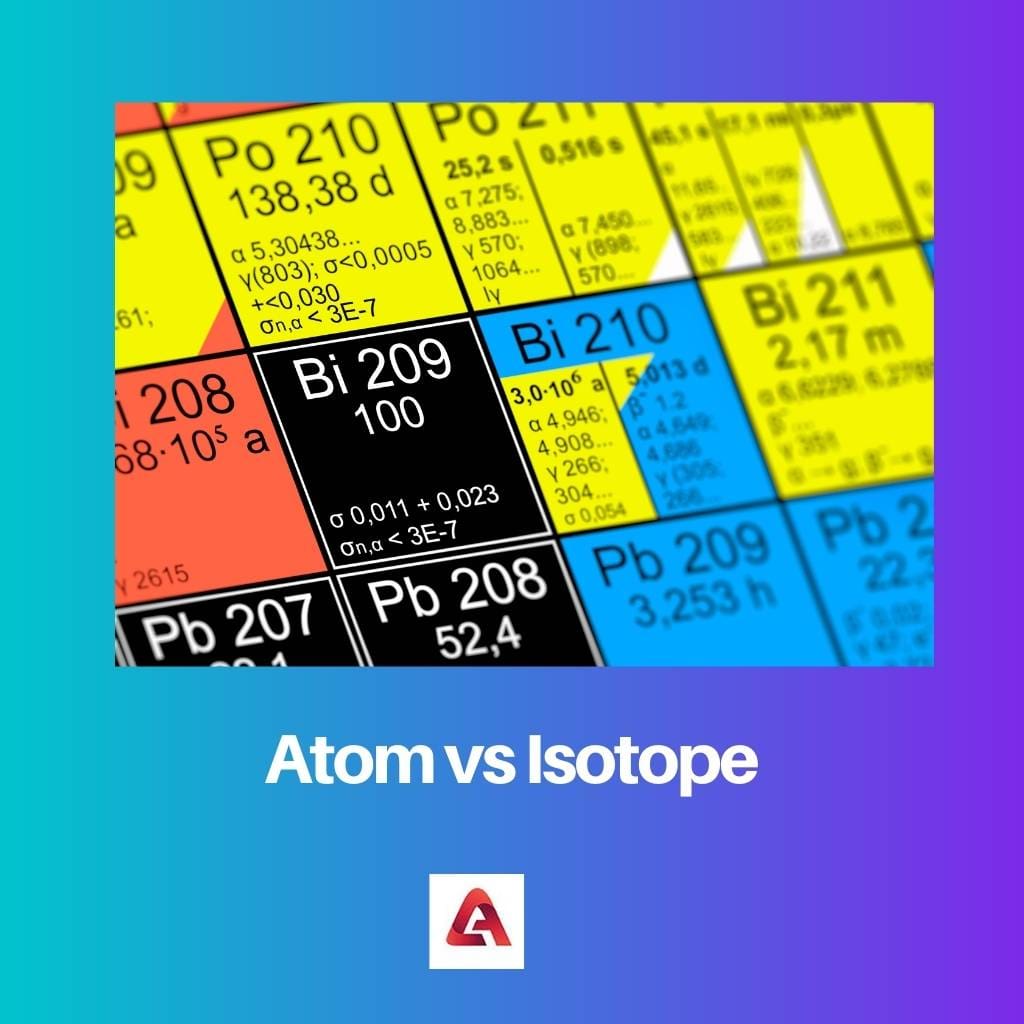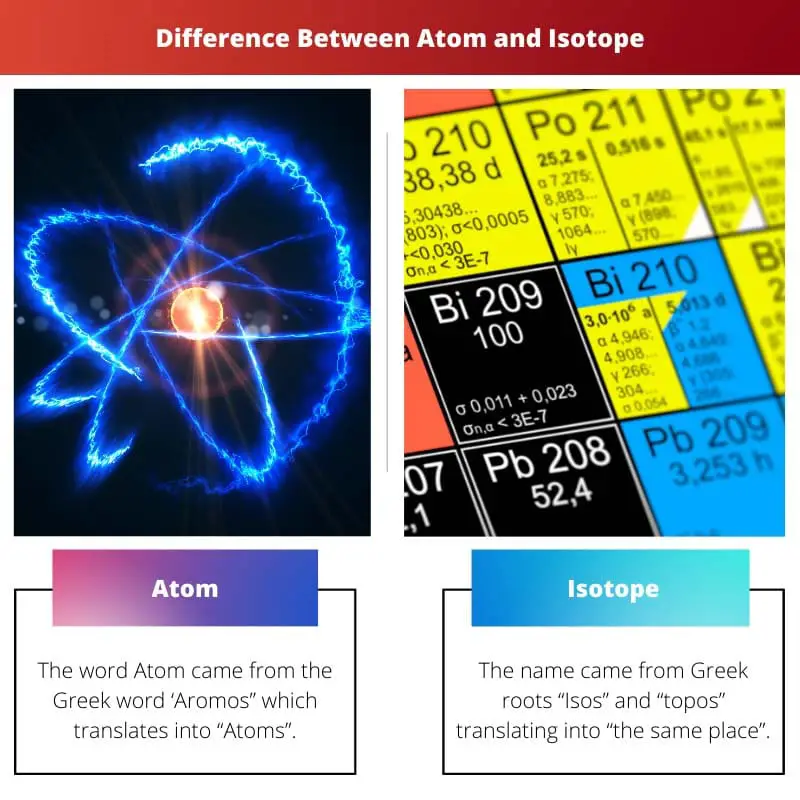Everything is made of something, from an apple to a human being. Isotope is a type of Atom which have a different number of neutrons.
They are the fundamental building blocks of chemistry and, in general, of everything. “Element”, in general, is a term that is used to describe a matter that cannot be broken down any further.
Key Takeaways
- An atom is the basic unit of matter and consists of a nucleus containing protons and neutrons, with electrons orbiting the nucleus. At the same time, an isotope is a variant of an element with the same number of protons but a different number of neutrons.
- Atoms are the building blocks of all matter, while isotopes can have different physical properties and atomic masses.
- Atoms are neutral, while isotopes may be stable or unstable and undergo radioactive decay.
Atom vs Isotope
Atoms with the same number of protons but different number of neutrons are called isotopes. The number of neutrons can change in an atom, but in the case of an isotope, they remain the same. Isotopes have bigger and larger masses compared to atoms since the number of neutrons is different.

Atoms are the smallest unit of any matter. Every matter starting from solid to liquid to gas, it’s made of something, and that is called Atom.
Isotopes are atoms with different atomic masses with the same atomic numbers. They are the same as Atoms with a different number of neutrons.
Comparison Table
| Parameters of Comparison | Atom | Isotope |
|---|---|---|
| Another name | Fragment, Molecule | Variant |
| Year of discovery | 450 BC | 1913 |
| Discovered by | Democritus in 450 B.C and John Dalton in 1800 | Frederick Soddy |
| Used for | They can be combined to create materials like crystal | Oil and gas exploration, nuclear medicine |
| Name came from | Greek word Aromos | Greek words Isos and Topos |
What is Atom?
The word Atom came from the Greek word ‘Aromos”, which translates into “Atoms” the term was coined by the Greek philosopher Democritus in 400 BC. Some drawings and illustrations of what he thought an Atom looked like.
An atom is a dense nucleus made up of protons and neutral neutrons. The heart is surrounded by electrons that are negatively charged.
The general structure of an Atom includes the following:
1. A nucleus is in the centre of the atom.
2. The nucleus includes positively charged protons.
The process of electronic tunnelling is used in different microscopes to see Atoms. GERD Binning and Heinrich Rohrer in the 70s built the machine.

What is Isotope?
The name came from the Greek roots “Isos” and “topos”, translating into “the same place. As a fact, The charge on the proton and electron are the same size but opposite and thus cancel each other out. There are two main types of Isotopes:
- Stable Isotopes: Elements with the same number of protons but a different number of neutrons.
- Unstable Isotopes: These decay over time and form into another different Isotope.
Simply defined, Isotopes are Atoms of the same element with the same number of protons but a different number of neutrons. The most common use for Isotopes is for nuclear power generation.
Main Differences Between Atoms and Isotopes
- The number of neutrons can change in an Atom, but in an Isotope, the number can’t.
- Isotopes have higher or more enormous masses than Atoms since the number of neutrons differs.

- https://pubs.acs.org/doi/abs/10.1021/ja9031083
- https://books.google.co.in/books?hl=en&lr=&id=SakNcRLKB34C&oi=fnd&pg=PA37&dq=atom+and+isotope&ots=jNsUBf-WF8&sig=yk1cVhBS9SwlwGNMFKf1FbRIeO8
Last Updated : 11 June, 2023

Piyush Yadav has spent the past 25 years working as a physicist in the local community. He is a physicist passionate about making science more accessible to our readers. He holds a BSc in Natural Sciences and Post Graduate Diploma in Environmental Science. You can read more about him on his bio page.

I am a biochemist, and I have to say that your comparative table was not only unnecessary but also incorrect.
I also found unimportant, but I think it’s not wrong.
My wife is about to start studying chemistry and I think this will help her to understand more, thank you.
You’re welcome, happy to help.
The topic is already over my head, but I found it very interesting to find out more about the differences
Exactly, I feel the same way. But I don’t understand why atoms can’t have different number of neutrons, is there any explanation for that?
This post is good and I think it could become even better with a few visuals.
I’ve read different articles about this topic, and yours is the most complete and understandable of all, good job.
What do you think about the explanation about the tunnelling process? I read some articles, and I don’t know if that’s entirely true.
I found this very joke, but I liked it too.
Very good post! Entertaining and at the same time full of good content.
I think that was a little boring, but very good in general.
Are we already in Chemistry class? A very good explantion, I think you can improve a little more, but I like the topic.
I think the post is very well written, but the comparative table was not necessary at all.
The article is good, but it could go into a little more detail. I’m a high school chemistry teacher, and I think it’s important for students to understand in-depth this difference
I’m a parent and have no chemistry knowledge, this article already helped me a lot.
I agree with you, the details could be more explored. A lot of people who read this will not necessarily understand chemistry.
Don’t you think the post is too technical?
I agree with the Ruby, but I see your point too.
To be honest, I like that way.
I never thought I’d see these two words: atom and isotope, I’m learning a lot, thank you. What do you think?